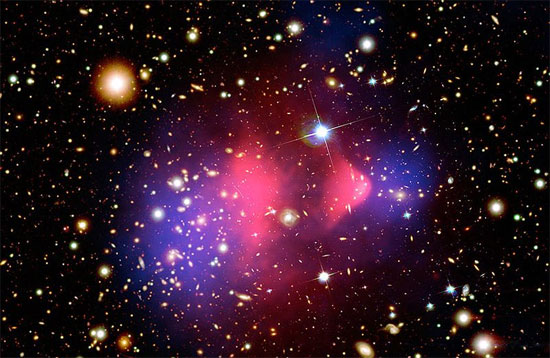Russian-American scientist hunts 'dark matter' in the universe
According to Voice of Russia, a group of Russian-American researchers have proposed a new hypothesis about the composition and location of "dark matter" in the universe.
Through the discovery of dynamic protons and electrons in the composition of "dark matter" , the team believes that they will interact, forming "dark" atoms .
Until now, scientists have only hypothesized about the hidden position of mysterious material. This entity does not emit electromagnetic radiation and therefore it is difficult to use the device to capture.

Many people still think that the particles of this entity hardly interact with each other. However, the Harvard University team (USA), led by physicist Andrei Katz, rejected the theory.
In his view, the nature of this mysterious entity is similar to that of ordinary entity, the interaction can occur not only at the particle level but also between atoms.
Mr. Katz also went from the usual physical nature to hypothesize the position of "dark matter " around galaxies, stars and planets.
He analyzed that due to the entity losing energy, the particles began to move more slowly. They gradually accumulate and form a flat disk around the Galaxy.
Physicists also argue that the "dark" atoms create "dark" ionizing gas (platma), whose impulses affect the formation of the early universe.
According to astrophysicist Sean Carroll of the Caltech Institute, the European Space Agency's "Gaia" telescope can monitor the impulse caused by "dark matter" disks.
The 'dark matter' science team is looking forward to "Gaia" being launched into orbit in the fall of 2013 to carry out a detailed mapping task of the galaxy, hoping to confirm it. my hypothesis.
- New explanation of the origin of dark matter
- Found signs of dark matter
- Observe the flow of dark matter, the farthest in the universe
- Decipher the mystery of dark matter
- Detecting dark matter fibers
- The mystery of dark energy
- Entering the universe 'dark'
- Revealing the first image of dark matter
- Scientists think they have accidentally found dark matter
- Observe dark matter with Tadem
- The mystery of dark matter has been decoded?
- Mysterious X-rays can reveal the nature of dark matter
 Van Allen's belt and evidence that the Apollo 11 mission to the Moon was myth
Van Allen's belt and evidence that the Apollo 11 mission to the Moon was myth The levels of civilization in the universe (Kardashev scale)
The levels of civilization in the universe (Kardashev scale) Today Mars, the sun and the Earth are aligned
Today Mars, the sun and the Earth are aligned The Amazon owner announced a secret plan to build a space base for thousands of people
The Amazon owner announced a secret plan to build a space base for thousands of people